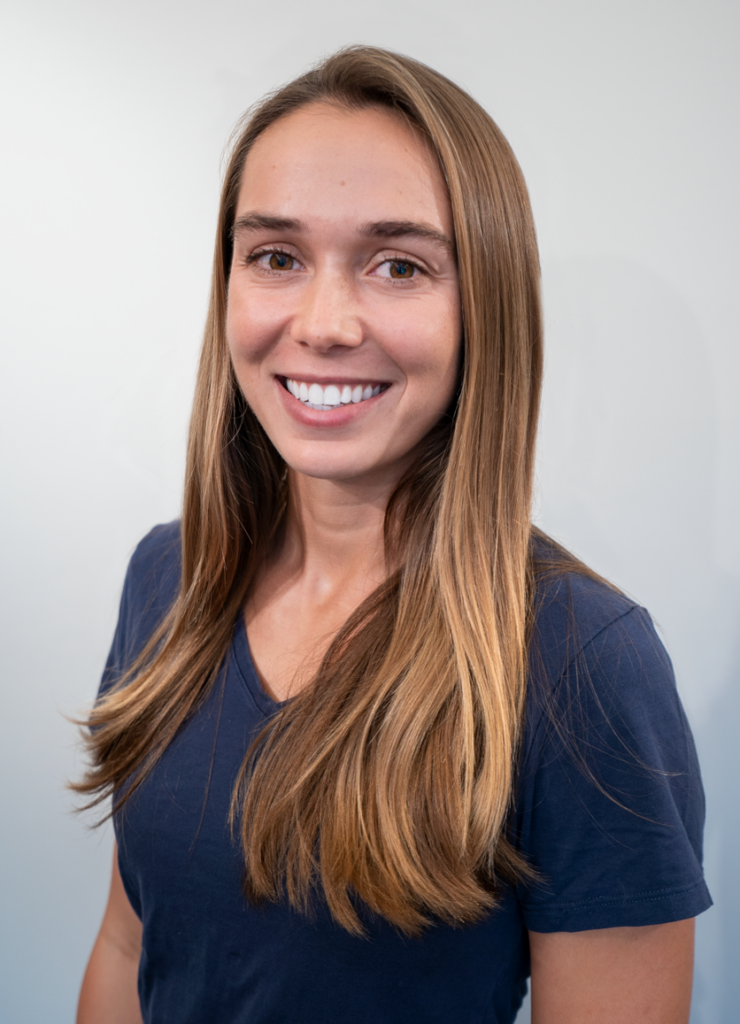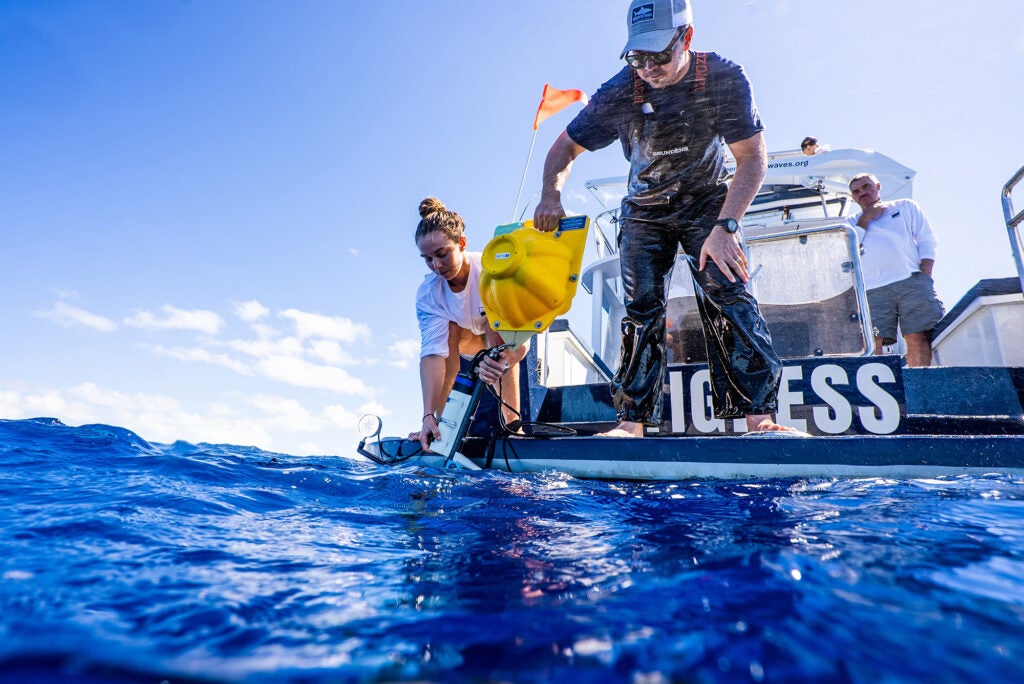KINGSTON, R.I. – Feb. 15, 2023 – Christine de Silva’s interest with sharks may have started in a bizarre way – an autopsy.
An undergraduate at the University of Miami, de Silva was in a class of STEM and communication students teamed up to promote scientists’ research through infographics and short videos. One day, Professor Neil Hammerschlag, head of the university’s Shark Research and Conservation lab, came into the class.
“He asked, ‘Does anyone want to come in and film a necropsy for us?’ And my hand went straight up. I was thinking, ‘Yup, that’s me. Don’t look at anybody else.’”

Fast forward about 10 years. De Silva sits in the Ocean Science & Exploration Center on the University of Rhode Island’s Narragansett Bay Campus – a student in URI’s Blue MBA program, chief executive officer of a small oceanography technology company, and preparing for a trip to South Africa to film deep sea sharks for the Discovery Channel’s popular Shark Week.
“Looking back, I can see that this is where I was always meant to be. I don’t think I could ever work in an industry that is not marine related,” says de Silva, 29, who grew up on Ryder’s Cove in Chatham, Massachusetts, and now lives in Jamestown. “Over the past 10 years, I have executed a plan that ensures that I can continue to work on all my passions – field work, science communication, academic research and starting my own business.”
De Silva likes to say everything in her life is intertwined. So, when she travels to South Africa later this month for her third Shark Week show since 2020, she will be representing her company, Juice Robotics, her research work with Beneath the Waves, and URI.

“I try to make sure that everything I say and do as an individual on these shows is real and educational,” she says. “But what’s really great about these shows is I can bring all my equipment and do research without having to get funded. For this trip, they want to obviously film deep sea sharks. You can’t have a show without video, so there’s only a few places that they can get these cameras. And my company makes them.”
Since her youngest days as a child gazing into tidal pools for sea life during summers on Cape Cod, she’s loved the ocean. She grew up sailing, surfing, windsurfing, and attending science camps in the summer – “not going to the cool camps,” she says.

“My mom loves the ocean. My dad loves the ocean. And I think I’ve always had an obsession for the natural world and a draw to the ocean. I have to make sure that if it’s too cold to go in, I can see it every day. And if it’s warm enough once I get in my 3/2mm [wetsuit], I’m in it every day,” says de Silva, who still sails competitively, especially on trips back to Miami.
At the University of Miami, de Silva became a part of the Shark Research and Conservation lab, eventually trading in her research interest in spiders for sharks. As part of her work for the lab, she took part in every sea trip she could. Her job was to photograph the sharks – tigers, nurse sharks, bulls, black tips – after they were measured and tagged.
“I was the only person who was allowed in the water with the shark, which made each experience all the more special,” says de Silva, who graduated in 2015 with a bachelor’s degree in biology and minors in marine science and art, focusing on photography.
At times, she helped sharks get underway after they were pushed back into the sea. One of the largest sharks was a 15-foot scalloped hammerhead, says de Silva, who is 5-foot-4 on her best day. But there was never a scary moment – the sharks were just happy to escape “an alien abduction,” she says.
“I just became obsessed with spending time in the water with them because they’re so beautiful,” she says.
That obsession followed her to Beneath the Waves, a nonprofit organization dedicated to promoting ocean health and using science and technology to promote ocean policy. The organization was founded by Austin Gallagher, who was a Ph.D. student in the Shark Research and Conservation lab when de Silva was an undergraduate. He hired her at Beneath the Waves and got her involved with Shark Week.
In her research with Beneath the Waves, she travels regularly – about a week each month last year – to research the deep sea and deep-sea sharks. It fits perfectly with her personal life. “I try to spend winters in Florida and the Bahamas and my summers on Cape Cod,” she says. “The sharks are doing the same thing. So, it works well.”
For Shark Week, her vantage point will be strictly from the boat, deploying cameras and filming sharks in the deep ocean off South Africa and lending her expertise on deep sea sharks to the episode, “Alien Sharks,” which will air on Discovery in July. The show is renting the cutting-edge, light-weight cameras from her company, Juice Robotics. The technology was originally developed by Brennan Phillips, a URI assistant professor of ocean engineering.
The episode, hosted by outdoor adventurer and Shark Week regular Forrest Galante, will search for sharks found at depths of up to 2,000 meters. “When we think of a deep-sea animal, usually we’re talking about things that live in the dark, under lots of pressure,” she says. “They’re going to look pretty crazy to us. They’re probably going to be very dark colored, close to black. They’re going to have really big eyes or no eyes. They’re going to move very slowly.”
“For me the draw goes beyond academics,” she adds. “We need to study this to understand how the deep ocean fits into global biogeochemical processes and affects things like the carbon cycle. But it’s also exploration for exploration’s sake. Each time I look at the footage from these cameras it’s a chance to discover something new. Sometimes that means we extend the range of an animal by finding it deeper than scientists previously thought.”
It was while working on Shark Week’s “Tiger Shark King” in 2019 with Phillips that she learned about URI’s Blue MBA program, a dual degree program in which students can earn master’s degrees in oceanography and business administration, advancing their potential roles in the blue economy. As they sat on an inflatable waiting for sharks to appear, she told Phillips about how she wanted to make a greater impact. She loved being a scientist but was interested in starting a company focused on the ocean. Phillips, who knew a few students who had gone through the Blue MBA program, thought it would be a good fit for her.
“Christine is an incredibly talented and motivated person who is passionate about exploring and protecting our oceans,” says Phillips. “Having worked with her on several research trips, she has a knack for operating oceanographic equipment safely and effectively, and she can also drive a boat better than almost anyone else. She also has a pretty expansive network of scientists and engineers that she works with, which really shows the breadth of her experience and ability to work with a diverse group of people.”
Phillips also introduced her to Matthew Jewell, who graduated from URI with a bachelor’s degree in ocean engineering in 2009 and founded Juice Robotics four years later. She joined the company two years ago and runs the business side, while Jewell focuses on technology. The company sells innovative, rugged and affordable technologies that make accessing all ocean environments easier and safer. The technology uses epoxy to make the equipment water and pressure proof, instead of heavy metal housings that are cumbersome and can fail at deeper depths. One of its products is a fiber optic fishing reel deployment system developed with Phillips, who is a partner in the company.
“Today, for the majority of equipment used in ocean exploration, you need a really big support vessel. That vessel is gas guzzling and requires a 20-person crew,” says de Silva. “What we’re doing is making equipment so small and so affordable that you can deploy it from a jet ski or an aerial drone.”
In her role as CEO, the Blue MBA, which she will complete this spring, has helped her on the business and science sides. Coming into the program with little background in business, she’s benefited from classes in such areas as finance, marketing and business administration. While she minored in marine science at Miami, the oceanography master’s degree program has helped her fully put the role of the ocean in perspective.
De Silva says URI is well-positioned to be a leader in the blue economy, and the Blue MBA is important to that role. She’s heard from college students and recent graduates who have studied business and want careers in which their work can have an impact on the ocean or the world, but don’t know where to turn. The Blue MBA program can be an answer for many.
“I think that’s something that students are looking for. I know they already are because I get kids calling me about it all the time,” she says. “URI can be the university on the East Coast that says, ‘You want to fit into the blue economy? Come here and get our degree.’”

